#Michael Jackson collaborator
Explore tagged Tumblr posts
Text
youtube
Music Legend Quincy Jones Has Passed Away At Age 91
Quincy Jones, the legendary music producer and composer, passed away at the age of 91 on November 3, 2024.
#viral trends spot#quincy jones#Quincy Jones death#legendary record producer#music industry icon#Grammy-winning artist#Michael Jackson collaborator#jazz musician#film composer#music arranger#television producer#African American music pioneer#Thriller album producer#We Are the World producer#Frank Sinatra collaborator#music industry influence#Quincy Jones legacy#pop music history#Quincy Jones career highlights#Quincy Jones Has Passed Away At Age 91#Youtube
0 notes
Text

damn...
#quincy jones#quincy jones legacy#music icon#thriller album#michael jackson producer#music history#quincy jones tribute#jazz legend#music producer#hollywood composer#quincy jones influence#legendary collaborations#frank sinatra#ray charles#music titan
324 notes
·
View notes
Text


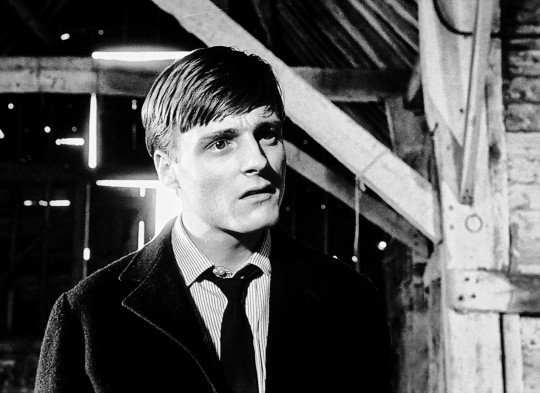
Michael Craze pops up as Vince Kelly, a teenage runaway from a borstal centre, in Gideon's Way: Boy With Gun (1.23, ITC, 1966)
#fave spotting#michael craze#ben jackson#doctor who#gideon's way#1966#boy with gun#itc#a relatively rare fave spotting! outside of his DW work‚ Mike didn't make a huge amount of appearances in cult tv‚ at least not many that#survive or are easily seen; he'd previously starred in Target Luna‚ a completely lost serial‚ but didn't return when the show carried on as#Pathfinders in Space (oddly‚ perhaps because of a change of director‚ every single returning character was recast) and beyond#there were also episodes of Dixon pf Dock Green and Armchair Theatre but these are also in all likelihood lost tv; others‚ like an ep of#Hammer's sci fi anthology Journey to the Unknown‚ are frustratingly unavailable to the average viewer (I was really hoping Network would#do something with JttU after they announced an agreement with Hammer but alas it wasn't to be)#mike would have been about 22 when filming this ep (around May '65) but was still largely playing juvenile parts as here#(his age isn't given but as a borstal runaway he's clearly intended to be a teen); this aired in feb or march '66 in most regions‚ by which#time he had presumably been cast in DW (or very near to it; he'd debut in The War Machines in June of that year)#DW would act as a sort of transition for Craze from youth parts into adult roles (i mean Ben's own age is debatable but I'd say he's surely#meant to be at least 18?). there'd be some more guest spots and a few horror films to come (he was a regular collaborator with Norman#J. Warren) but he doesn't pop up with the regularity of many other Who companions so this was a lovely little surprise (zero memory of him#being in it from when i first watched years ago)
28 notes
·
View notes
Text
the alternate version of michael/stevie collaboration and friendship that lives in my head is so beautiful and pure
#no i am not thinking about it like That#well... i mean i've entertained the idea. fujoshi that i am. but it's insane and feels vaguely disrespectful to everyone involved#that's definitely an alternate universe.... which is a beautiful universe 2 BE CLEAR#ok whatever. i just wish they were closer. in our universe. i wish they collaborated more i wish stevie took michael under his wing FR#like in a Big Way#we could've had stevie-produced and partially stevie-penned michael album(s).....#WHEN HE WAS A KID OMGGGG#little baby michael produced by stevie.... well idk how much production stevie had done by then#also Famously he was pretty busy#oh but imagine...#when the jacksons left motown what if michael had split too... he was what 17#damn... he should've just gone solo. he could write. he was extremely signable and producable. built-in fanbase#....i have so many thoughts#the POSSIBILITIES
1 note
·
View note
Text
Tumblr Biography: Michael Jackson
👋 When Michael met Quincy Jones on the 🎬 set of "The Wiz," neither of them could have 🔮 predicted the 🎵 musical revolution they were about to 🚀 unleash upon the 🌎 world...
#the wizard of oz#quincy jones#music producer#music production#fl studio#fruity loops#1980s#early 1980s#80s music#80s pop#80s#iconic#icons#michael jackson#king of pop#collaboration#leads#business leads#revolutionize
1 note
·
View note
Text
Pushing aside the fact that I am, quite possibly, a Kendrick fan—disregarding my biases, I think Drake needs to stop. Push Ups was a good diss. Surface level, vapid, but it possessed that mean, petty spirit that carries a diss track all the way. Even bringing up accusations that are, realistically speaking, unlikely still works because a diss is supposed to show just how much you hate a person and how cleverly you can bring it.
Taylor Made was weird. I get that it was a strategy. Drop the main diss first and then drop this one to really prod at Kendrick. Using Pac and Snoop AI voices sucks though. Distilling Kendrick as Taylor's underling also doesn't work because Kendrick only collaborated with her once (twice when they remade Bad Blood) and that's it. Meanwhile Drake is out here always looking for new, up and coming artists to pounce on their trends or cling to established artists. Then it got taken down, because of course it would have been. You used 2Pac's voice. Did you really think his estate, his family, wouldn't do anything?
So he bought Pac's ring and used his voice without permission. More and more we see just how much of a vulture Drake is.
And then Euphoria drops.
Your first diss was met with solid reactions. Your second got taken down. Kendrick drops on a random hot Tuesday, and in a matter of hours surpasses your numbers that took weeks to accumulate. Kendrick did that. Euphoria was also harsh, clever, and sounded so good that people kept replaying it over and over again. Once more, Kendrick schools you.
A few insiders then say that Drake will drop that night. Right after. But he then allegedly gets cold feet. A few hours later from when Drake was supposedly ready to drop but backs out, Kendrick drops 6:16 in LA.
In your previous disses, you begged Kendrick to drop something with quintuple entendres. Euphoria did that. But he took it a step further by naming his second diss 6:16 in LA.
June 16: Father's day. Referencing the fact that Drake has been proven to be a deadbeat father.
June 16, 1971: Tupac's Birthday. Kendrick idolizes him. Drake steals from him.
June 16, 2019: First episode of Euphoria drops. A show Drake is listed as a producer on. A show about underage girls entering a life of sex, substance abuse, and more. Things that Drake has been accused of repeatedly in the past.
June 16, 2011: in June 2, 2011, Kendrick posted on his twitter that there will be a concert at Toronto on 6/16. Allegedly this is where Drake and Kendrick first met.
6:16 AM: The time of release for this track.
6:16: Multiple possible Bible verses, given Kendrick's Christian background.
Other claims felt like reaches though, so I'll stick to that.
The final two lines of 6:16 also reference the Michael Jackson, R. Kelly, and their song "You Are Not Alone". Drake, who has always claimed he is Michael Jackson or at the very least his equal/successor, is now tied to him in a way he does not want. Because we know all of the dirt that came out after MJ's death. We all know what R. Kelly was sent to prison for. And we all know what Drake has been accused of multiple times.
Kendrick also alludes to the fact that you have a leak in your circle, Drake.
So Drake drops Family Matters. A scathing 7 minute song that makes fun of the GKMC van. Saying that Kendrick's daughter isn't his. Saying that his wife cheats on him with security. Saying that he beats his wife.
Now, these are enormous accusations levied. But Kendrick has responded before, years ago, that the DV accusations were false. He has also always been open about his faults. Adultery. Sex addiction. Insecurity. God complex. Kendrick, for better or worse, has always laid out nearly every aspect of his younger life on his songs. This also helped by the fact that in both Euphoria and 6:16, Kendrick says that Drake has spent millions on finding dirt on him but came up with nothing. Again, these accusations can still be proven true and if so, Kendrick needs to be held accountable for them.
But if not? Then Drake just adds another to the pile of "He's a liar and a master manipulator."
Drake also posts a Parody on his Insta that gains little to no attention because 30 minutes after dropping Family Matters and supposedly going on his victory lap, Kendrick drops meet the grahams.
Another thing. 6:16's cover was a glove. That meant nothing to us, the audience. meet the grahams makes it make sense by zooming out of the glove and showing off a shirt and drugs that Drake supposedly uses. Drake has not had any receipts with his accusations against Kendrick. Kendrick puts Drake's supposed prescription, his full name, on a bottle of Ozempic. Kendrick, for now, seems to make good on his threat. OvO, Drake's company, is full of leaks. And they're leaking it straight to Kendrick Lamar.
Nearly 24 hours later, Kendrick drops Not Like Us.
Euphoria was a general character dissection and assassination of Drake: Insecure about his identity as a biracial man. Culture Vulture. Blaccent user. Code switcher. Fake abs. Womanizer. Misogynist. Using black features just to feel black enough. A deadbeat dad that knows nothing of raising a child. And even revokes Drake's ability to use the N-Word (I have no stake in that I am Asian so I will keep my brown mouth shut for that).
6:16 in LA was an ominous threat that slowly reveals that Kendrick has insider information on Drake. That he is ready to leak so much more should Drake continue.
meet the grahams is a brutal open letter to Drake, his parents, and even to Adonis, Drake's son. Saying that Kendrick could be a better mentor to Adonis. Saying that Drake abandoned you and that's not your fault. Don't be like your father—whatever anyone says, for better or worse, you are a black man and don't code switch just to make yourself feel better. He says that Drake failed his mother for what he did to women. Saying that Drake's father is the cause of his gambling issues. Drake is a body shamer. Leaving the mother of his children to rot. And of course, the reveal that Drake has a secret daughter, the same way Pusha T revealed Drake has a son. Adonis.
And of course, now. Not Like Us. Where Kendrick goes all in on one topic that he has alluded to in every diss track before. Drake is a groomer. A pedophile.
I am sick. I should not be tuning into this beef. But my fever can go ahead and end me, I need to know how this ends.
5K notes
·
View notes
Text
Let it Be Close-watch
Paul, sweety, it's beautiful, but it's killing the vibe.
Ringo looks like a very old, very tired lab rat whose been put through the maze a few too many times
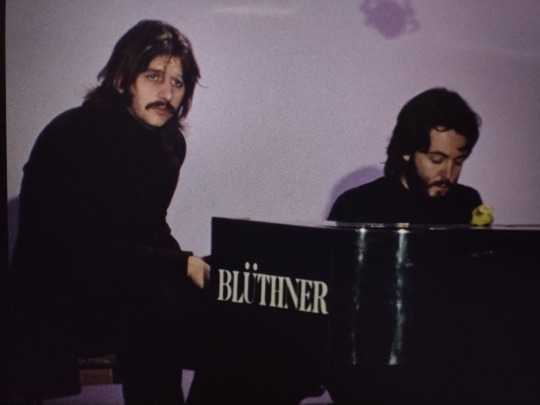
Somehow the air-brown mostly eaten apple is very appropriate.
She looks far too sweet here to ever let John down. Yoko has very kind eyes.
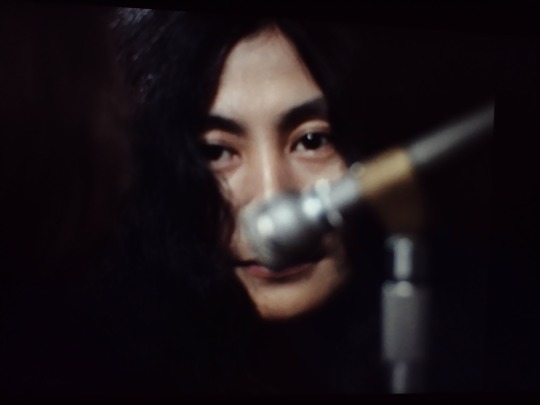
I love how it makes it seem like Paul and John are calling Maxwell “the corny one” but really we know from Get Back that they're talking about a particular arrangement they were trying out for Don't Let me Down.
I swear he's saying “John” there, not “Joan” and also he said “came down upon His head” so… Oh! And Max died in the end in this version? “Sure that Max was dead” Okay. So Paul kills John and then himself. Murder suicide story. Yeah, Paul, you're doing great mentally, we can all tell.
I love how George getting electrocuted was important enough to make the cut for both films. Poor baby. “If this boy dies you're gonna cop it” from the guy who was just singing about a serial killer.
They're so silly
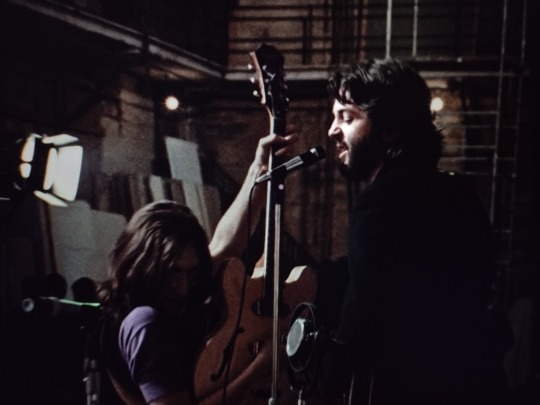
Yoko does not agree with me
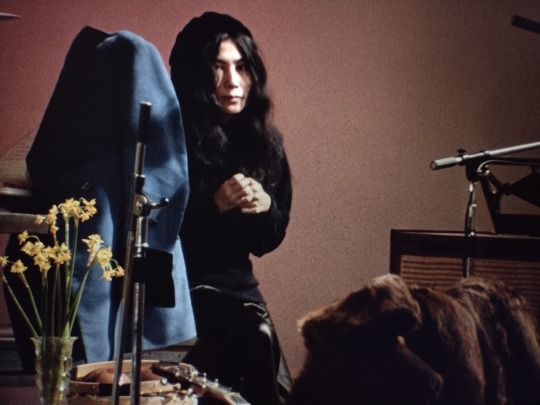
Paul: stealing your man, sweetheart. John: oh no I'm being stolen teehee!
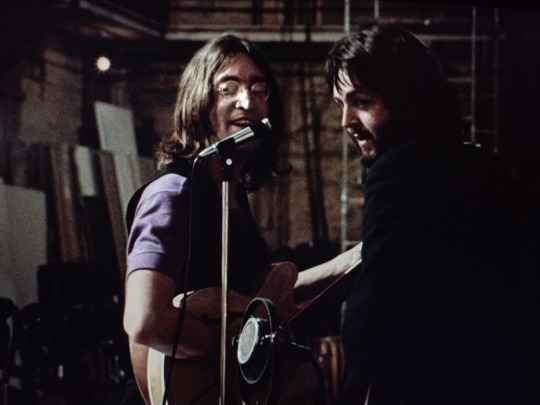
They're so silly
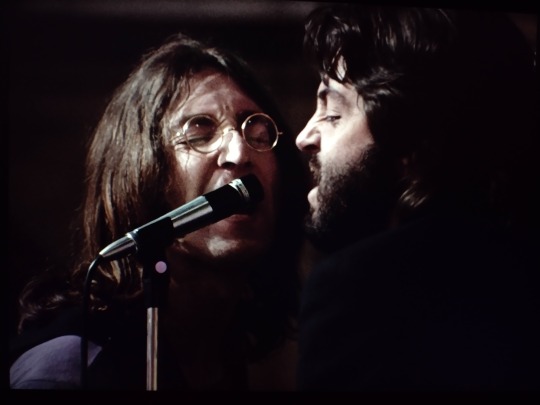
Oh wait, were those bitchy looks at George??? Because there he is. Idk could easily be him or Yoko.
this poor autistic baby trying to use words (not his language) to explain music (his language)
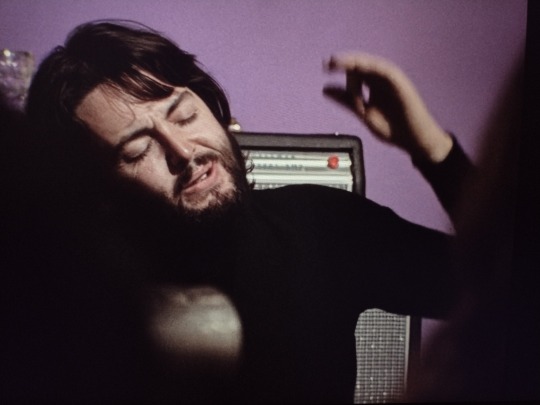
“Good MoOornin! Wooah!” I think I just … You know how Mike said people were booing Paul in the theater watching this? Yeah it's because they were pissed he didn't step out of the screen and onto their necks.
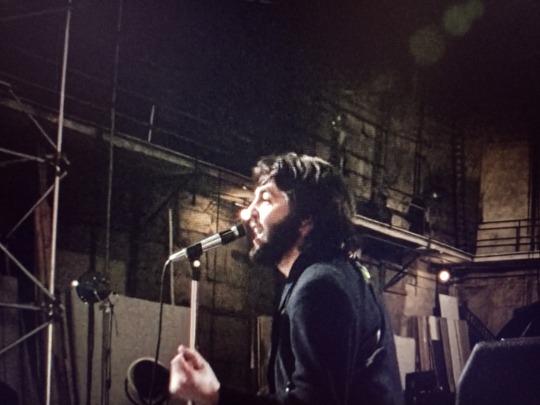
Oh Michael put himself in his own movie too? Huh, cool.
They are always in my heart
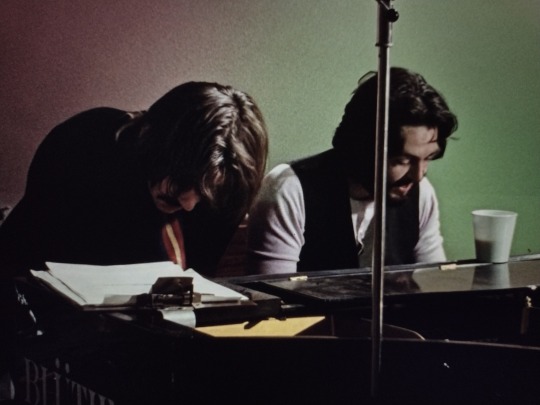
The way Paul says “get on the mic” to John??? I would've thrown something, that was so fucking bossy! Just his tone and his face and his angry pointing fingers. So mean. And John just goes “okaaay”. Oof.
Ringo covering his eyes like a little kid watching a scary movie during the orange sweater fight. Same, babe.
Sounds like the original lyric John's going for is something long “All I want is you. Nothing else is gonna do.” But that obviously didn't fit with the tune. I wonder if there was a particular conversation with Paul being controlling that made the “everything has got to be the way you want it to” line click in.
Oh my gosh! So George is showing I Me Mine to Ringo and Paul and he says the “I don't give a fuck it can go in musical” line before he even plays it. Not after John's making fun of him like he does in Get Back. Nagra reels experts: which one is correct??
George: it's a heavy waltz. Ringo:*claps hands angrily and punches the air to a ¾ beat. I love him, he's like the core of “Beatle humor” to me.
Woah there! Okay this is the John/Yoko pda Peter Jackson cut, I see. I wonder if there's a lot more footage of them swapping spit that might make the “oh John was just so in love” theory more reasonable.
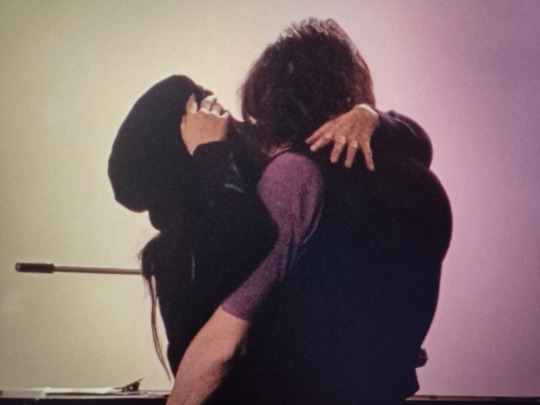
It's extremely impressive that George just wrote this whole thing last night. You know? John and Paul have brought in all fragments from what I can tell. He's the only one to come in with a basically finished product.
LMAO and we're just going to Apple now. No reason. Nothing happened. Nothing to see. Moving on.
Ringo is so so cute pretending to hide from the cameras. Really he should've been the cute one.
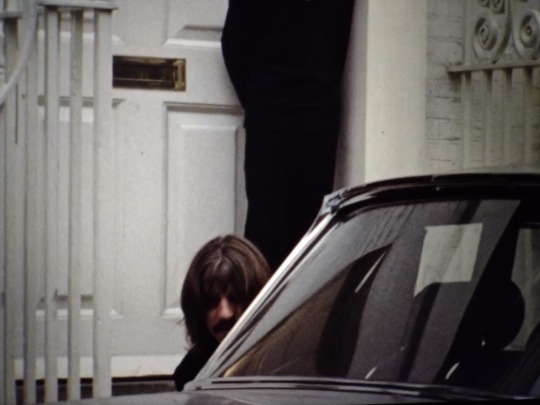
Is it just me or does Paul drop the sillies and get sad when he sings “always be mine” at John? It's his regular voice, too, for a minute, if I'm not mistaken.
Silly cuties. But John's grin and little sexy tongue action happens the second time Paul sings always be mine, so…
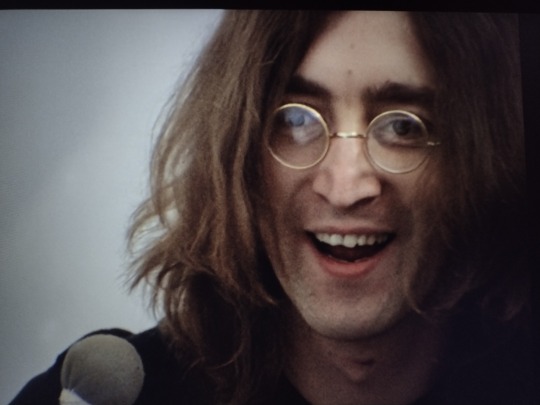
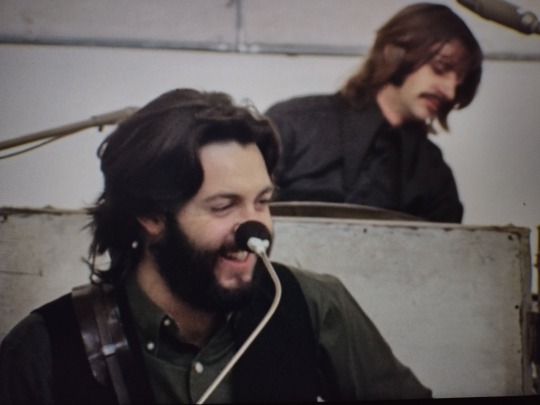
What friendly artistic collaboration looks like when it's not psychosexual
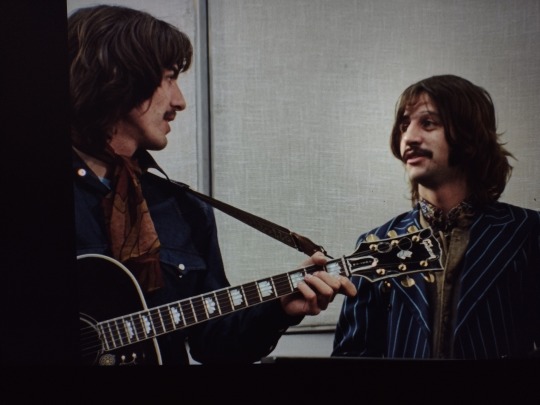
Paul: have you played the dubs? George: yeah. Terrible. Paul: Great! Ringo: terrible. John: laughs Paul: (sarcastic) oh, so dreadful. …. John: where's my guitar? Paul: (still sarcastic) well we're just the greatest band ever. Idk I just like this dialogue. It's very them, you know?
This is adorable.
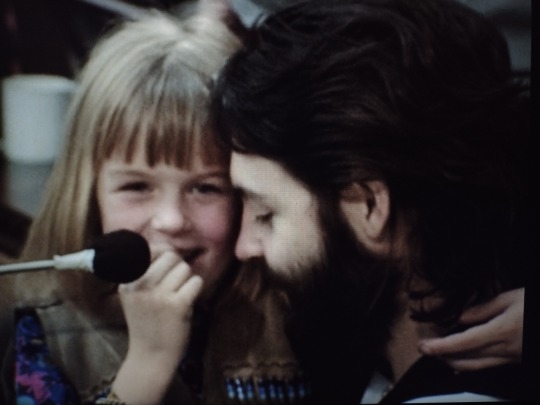
But I also love how they're already communicating with eyebrows, you know? They just bonded so fast and I find that beautiful.
And then Heather ups their game from taking turns going “chchchchch” into the mic to meowing into the mic. She looks at Paul like “okay your turn” and he sets her down lol he's thinking ‘if I meow into the mic right now after John already had a sex dream last night about me, he might actually cream his pants and we can't have that on camera’
Lol Billy just magically appeared!
Paul you're literally so annoying. You started the goofing off and now you're like “alright lads, that's enough.” Mkay.
He is unbelievably sexy and talented though so you know he does have those little things going for him. Someone write me a Paul/Billy fic please!!
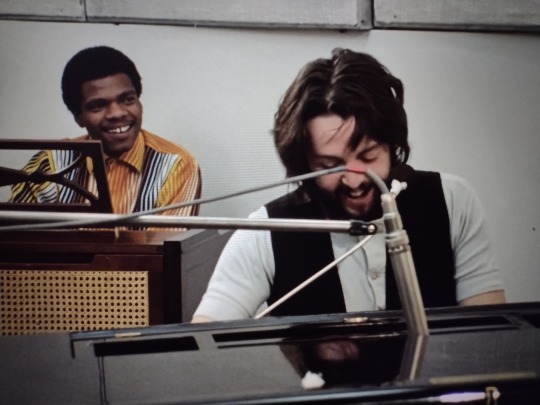
Kinda crazy how they all four just slide straight from “Kansas City” to “Miss Ann” to “Lawdy Miss Claudy”. Makes me think of something they might've done in Hamburg.
I'm sorry but Paul finishes “please don't excite me baby. I'm down in misery.” And John's immediate answer is, “well you can get it if you want it, and if you want it you can get it!” And Paul ends up singing “I want it I want it I want it I want it”. Nice. Very subtle, boys. And that's before John gets kinky.
I love how Heather just forces a hug from George and then immediately runs away. What a cutie.
But really. How did anyone watching this get the idea that John hated Paul? Just confirmation bias I guess?
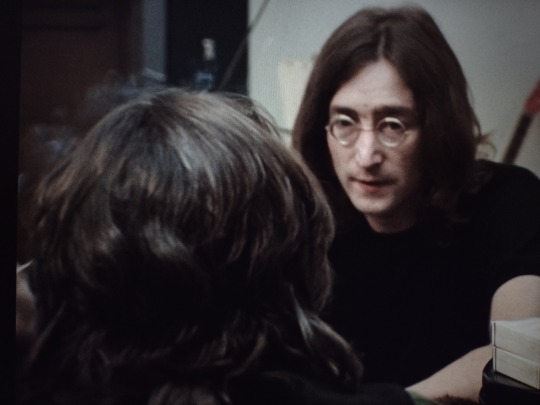
All the cut off conversations kill me but especially the one where John's working though Paul's anxieties. They're just in the middle of it and then cut. “two of us Sunday driving…”
Someone should do a study of whistling in their songs. I feel like it's another one of their tip offs that “hey this one is about us” Anyway I love John's whistling here. He's so good at it. I can just imagine him as some farm boy picking apples, you know?
Imagine booing this poor stay puppy though, like. What? I mean, what if Johann Weiner was wrong and John wasn't crying at the sight of him and Paul playing triumphant together on the rooftop, but at Paul playing his little heart out about their doomed love. Idk it's probably both. Let's be real, John was bawling through the whole thing.
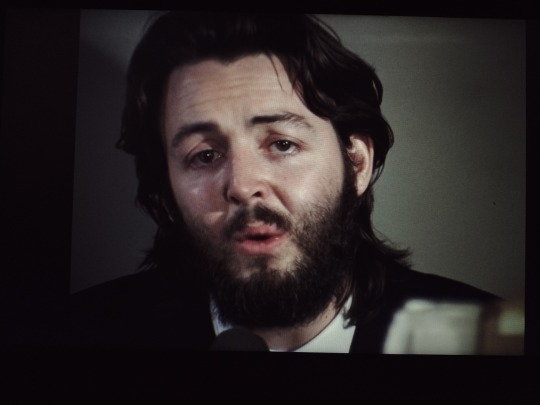
What is George laughing at? Picture quality is garbage because evil corporations don't let you take screenshots of their content, but he looks like that one kid in your elementary school class that just dumped Cheetos all over his crushes desk and thinks he's a criminal mastermind.
Also I do appreciate all the attention given in the chosen shots to the musicianship. I bet they liked that at least if they had the heart to like anything about the movie at the time.
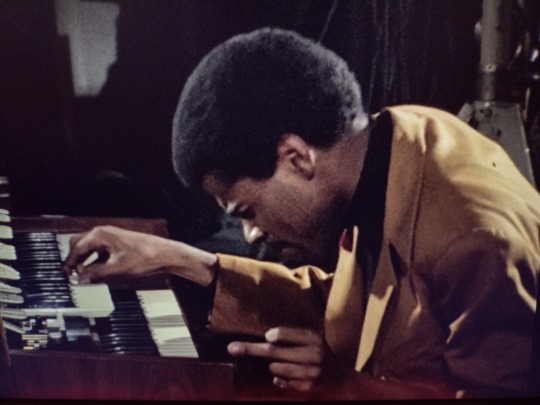
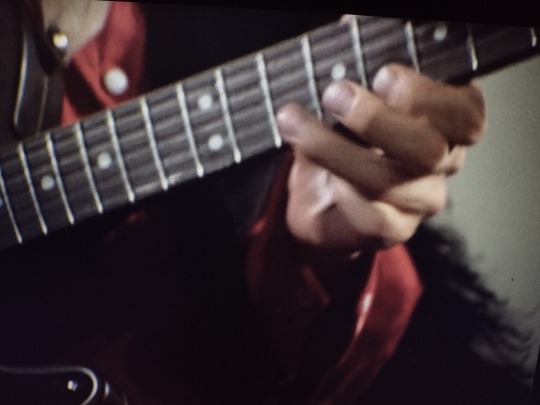
I'm sorry but I love how in sync Mo and Paul are. With this ducking and later the shimmying. I know it's wrong to ship Ringo’s wife with one of the Beatles she didn't sleep with, but… idk I really want her to have bedded all four at one point, you know? She deserves it, being an og.
Okay but yeah I'd be having a public meltdown if I fumbled that too holy fucking shit
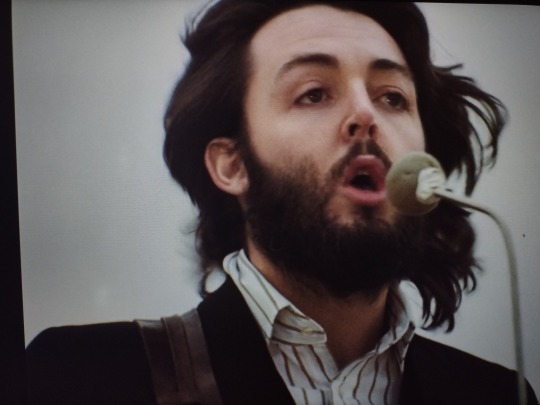
Ringo feeling himself as he should
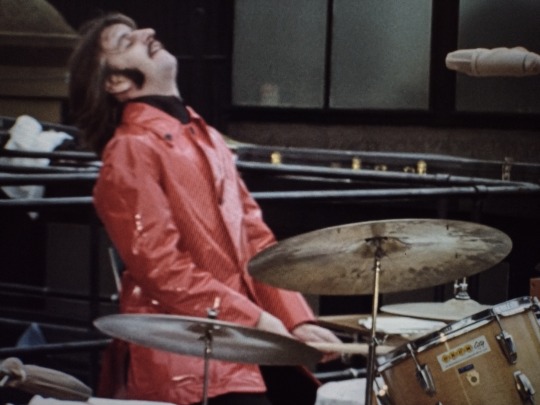
George just looks like he smells nice. Unlike the others. You know?
John has such a beautiful smile. If somebody looked at me like that I'd put him up on a giant screen behind me on my world tour after he'd been dead for forty years too.
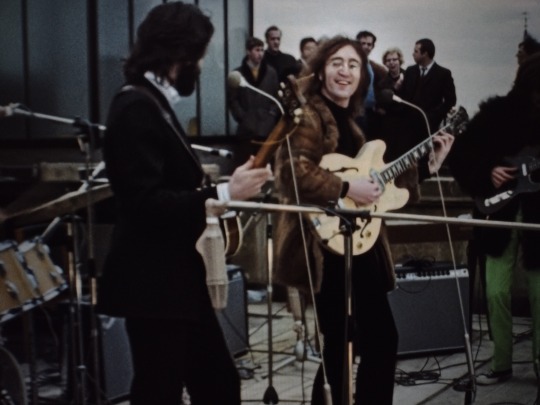
That pleeeaaaheeeaaase though. Looking at Paul. How did he survive I'll never know.
The cut from screaming Paul to grouchy nap lady is extremely painful.
John was so cool in this concert. Like the epitome of cool.
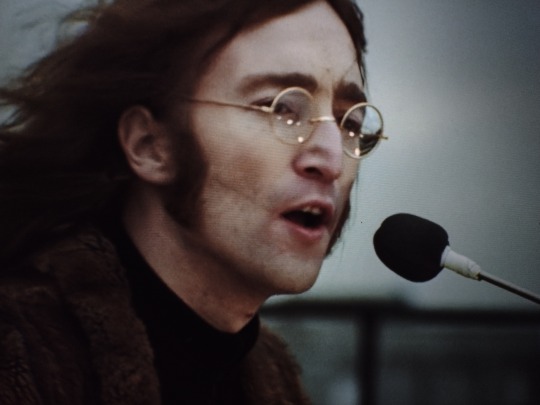
Kevin, my love, thank you for your service
I love Yoko leaning so far and craning her neck. She's like a mom at a school talent show. Like “I only came to see my baby.” Type vibe. Which is exactly what she's doing, unlike Mo, and honestly I find both of them extremely valid
You know in movies where the romantic leads are never looking at each other at the same time?
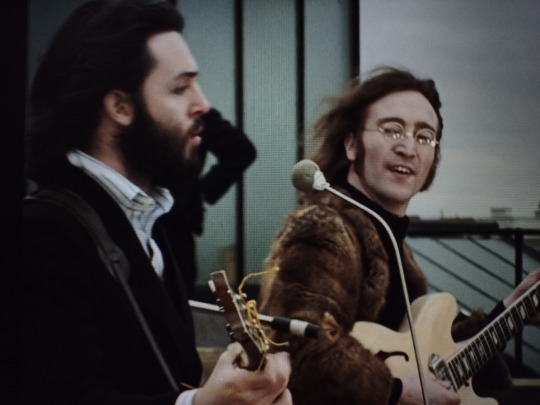
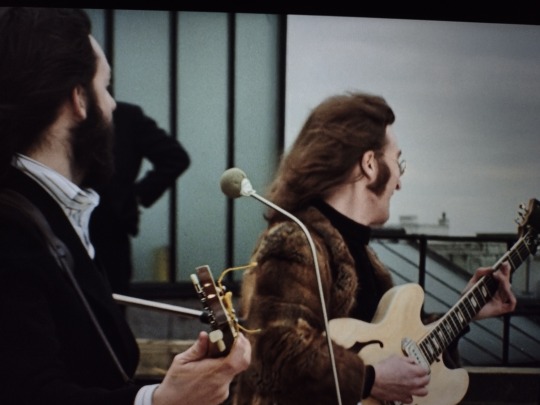
I think I watched George and John switching back on their amps like fifty times because I just love it so much. And from this angle, you can see John's saying something to Paul about it. He looks serious and he's shaking his head. I wonder what he's saying.
Mal Evans I love you forever for this. Look at his hand on the rail, just blocking them off completely, so protective.
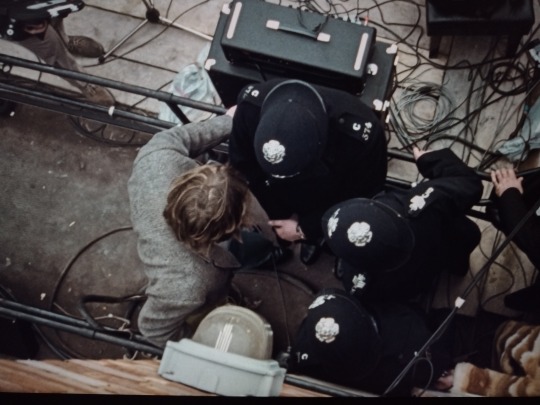
Them turning to each other at the end always gets me. It's automatic, like second nature, and it's the last time ever. They deserved better.
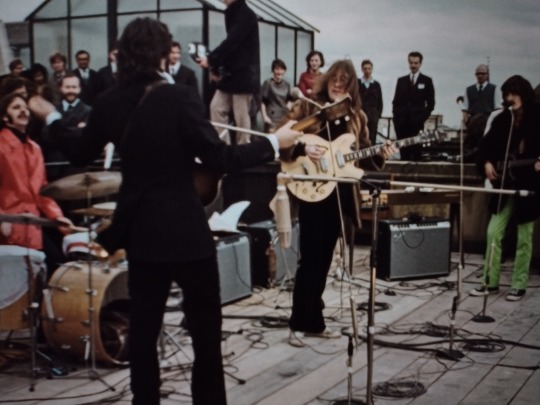
Oh Darling duet in the credits are you fucking kidding me??? Was that in the original? “Believe me, when I tell you.” “Oh I do.” That's the second time that they gave away in this footage that they know they're talking to each other in their music.
Alright, that's it, I guess. And then MLH is haunted by this experience for forty years until he makes Two of Us to purge the demons.
266 notes
·
View notes
Text
⸻ 𖤓 | VEDIC ASTROLOGY MASTERLIST (Vol. 4)
→ Volume 1 | Volume 2 | Volume 3
POWER AND CONTROL: ASHWINI, MAGHA AND MULA
VEDIC ASTROLOGY OBSERVATIONS AND NOTES
YOUR BIG 6 IN VEDIC ASTROLOGY
NODAL DOMINANT THEMES
MICHAEL JACKSON: BIRTH CHART OBSERVATIONS
SEXUAL BEHAVIOR AND ANIMAL YONI
MARS x KETU x SUN
KETU THEMES IN THE MEDIA
WHY CERTAIN PEOPLE CAPTURE THE SPOTLIGHT?
KRITTIKA NAKSHATRA (26°40' ARIES - 10°00' TAURUS)
KRITTIKA THE WILD WOMAN
WOLVES IN HUMAN DISGUISE: KETU-RAHU
27 NAKSHATRAS THROUGH MANY FACES
ASTROLOGICAL CONNECTIONS IN CREATIVE COLLABORATION
JUPITER WOMAN x KETU MAN
THE GODDESS LALITA AND THE LOLITA ARCHETYPE
VENUSIANS: THE CULT OF EXCLUSIVITY
VENUS NAKSHATRAS AND THEIR PARTNERS
THE SHADOW OF ANURADHA & THE BLACK WIDOW
MLECCHA NAKSHATRAS - WORLD WIDE WILD
HOW WOMEN INFLUENCED BY DIFFERENT PLANETS ACT IN ONE-ON-ONE RELATIONSHIPS
SATURN/SOLAR WOMAN AND KETU/JUPITER MAN DYNAMIC
SUN DARAKARAKA: THE POWERFUL SPOUSE
ASTROLOGICAL OBSERVATIONS: 5H PLACEMENTS
MURDERS AND KETU NAKSHATRAS WOMEN
THE PAIR OF TWINS: ASHWINIS
ASHWINI OBSERVATIONS
DITA VON TEESE’S NATAL CHART
YONI ANIMAL OBSERVATIONS
ASTROLOGICAL ANALYSIS: SIMILARITIES BETWEEN IAN SOMERHALDER AND MEGAN FOX
SIDEREAL INDICATORS OF BEING ALLURING, MAGNETIC, & SEDUCTIVE
THE ASTROLOGY BEHIND: MISS UNIVERSE 2024
ROHINI & ASHLESHA: THE SIREN ARCHETYPE
NAKSHATRA ANALYSIS: ROHINI |
★ THE BEAUTY OF: ROHINI | DHANISHTA |
BEAUTY PLACEMENTS
(THE SUBSTANCE): BHARANI THEMES
KETU IN THE HOUSES
MAGHA’S THRONE & ANCESTOR CONNECTION
SUCCESSFUL WOMEN WHO BUILT A MAN
MERCURY ATMAKARAKA: SOULS IN SEARCH OF DIALOGUE AND WISDOM
A MINI EXPLORATION OF MULA LAGNA NATIVES
ROHINI: LOVE TRIANGLE?
ROHINI AND CURIOSITY
SOME OBSERVATIONS ABOUT KRITTIKA NAKSHATRA
THE KETU WOMAN DICHOTOMY
NOT FEELING UNDERSTOOD BY OTHERS: ROHINI NAKSHATRA
THE SUBSTANCE (2024): PURVA BHADRAPADA AND VISHAKHA THEMES
VENUS DOMINANT THEMES — NAKSHATRA OBSERVATION SERIES
VENUS IS ALSO NOT AS SOFT & GENTLE AS PEOPLE THINK
MOVIES WITH PROMINENT TRINE NAKSHATRA INFLUENCES
SUN DOMINANT THEMES | OBSERVATIONS
#sideral astrology#vedic astrology#vedic astro notes#vedic astro observations#rahu#ketu#astrology community#horoscope#zodiac#nakshatras#astrology masterlist#masterlist astrology#d9 chart#navigation#masterlist#masterpost#astrology masterpost#jyotish#bhavat bhavam#atmakaraka#lagnesha#vedic notes
101 notes
·
View notes
Text

Bizarre as it sounds, it was KISS frontman Gene Simmons who persuaded his friend - besequinned old-school showbiz diva Liza Minnelli - to venture out of her jazz hands-and-showtunes comfort zone and collaborate with London synth pop duo The Pet Shop Boys. The partnership produced an album entitled Results, which was released 35 years ago this month. Buoyed by lush strings (arranged by David Lynch’s regular soundtrack composer Angelo Badalamenti and Anne Dudley from Art of Noise) and The Pet Shop Boys’ signature pulsating electronics, Alfred Soto of Pitchfork has praised Results for capturing “the mood of chic Upper East Side regret - of confidences exchanged in private cars inching north on Lexington Avenue.” Many remember Results best for its top ten first single, a storming hi-NRG disco twist on Stephen Sondheim’s “Losing My Mind”. My personal favourite, though, is the irresistible subsequent single “Don’t Drop Bombs” (issued 25 September 1989 – 35 years ago today! It peaked at a more modest 46 in the UK charts). “I'd rather not have to hear about / Your other girls on your expense account / I know you carry on, behind my back / With your secretary, you'll have a heart attack …” Minnelli raps (yes, RAPS) before warning “Don't tell me about your lack of restrictions / Guilty records and previous convictions / Or I shall start playing rough …” It’s sublime AND ridiculous! I’m the first to admit that in 1989, at the height of my punk snobbery, I would have rolled my eyes in complete disdain. Critics adversely compared Results to the Pet Shop Boys’ work with Dusty Springfield, and I probably agreed with Trouser Press’ assessment that “the vast stylistic gap between singer and songs makes the record quite comical.” Certainly, the ultra-camp video for “Bombs” – with Minnelli channeling Michael Jackson-meets-Cyd Charisse, with multiple costume changes – is hysterical. But today I acknowledge that Results slaps HARD. In conclusion: Liza, I was wrong and I’m sorry. Now sing along with me: “When you've erupted / You're totally destructive …”
31 notes
·
View notes
Text
New Six-Part, 12-Hour Series Directed by Ken Burns, Sarah Botstein and David Schmidt and Written by Geoffrey Ward
PBS to Launch Largest Outreach Effort in Network’s History, with Filmmaker Events in 25-plus Markets, Station Engagement Across the Country, Extensive Educational Materials, and Partnerships with Leading National and Local Organizations
Washington, DC – January 9, 2025 – THE AMERICAN REVOLUTION, a new six-part, 12-hour documentary series that explores the country’s founding and its eight-year War for Independence, will premiere on Sunday, November 16 and air for six consecutive nights through Friday, November 21st at 8:00-10:00 p.m. ET (check local listings) on PBS. The full series will be available to stream beginning Sunday, November 16 at PBS.org and on the PBS App.
The much-anticipated series, which has been in production for eight years, was directed and produced by Ken Burns, Sarah Botstein and David Schmidt and written by long-time collaborator Geoffrey C. Ward. The filmmakers and PBS scheduled the broadcast for 2025, the 250th anniversary of the start of the war, which began in the spring of 1775, more than a year before the Declaration of Independence.
The film, narrated by Peter Coyote, includes the first-person voices of nearly 200 individual historic figures, read by a cast of actors, including Adam Arkin, Jeremiah Bitsui, Corbin Bleu, Kenneth Branagh, Josh Brolin, Bill Camp, Tantoo Cardinal, Josh Charles, Hugh Dancy, Claire Danes, Jeff Daniels, Keith David, Hope Davis, Marcus Davis-Orrom, Bruce Davison, Leon Dische Becker, Alden Ehrenreich, Craig Ferguson, Morgan Freeman, Christian Friedel, Paul Giamatti, Domhnall Gleeson, Amanda Gorman, Michael Greyeyes, Jonathan Groff, Charlotte Hacke, Tom Hanks, Ethan Hawke, Maya Hawke, Lucas Hedges, Josh Hutcherson, LaTanya Richardson Jackson, Samuel L. Jackson, Gene Jones, Michael Keaton, Joe Keery, Joel Kinnaman, Tracy Letts, Damian Lewis, Laura Linney, Josh Lucas, Michael Mando, Carolyn McCormick, Lindsay Mendez, Tobias Menzies, Joe Morton, Edward Norton, David Oyelowo, Mandy Patinkin, Wendell Pierce, John Proudstar, Matthew Rhys, Liev Schreiber, Chaske Spencer, Dan Stevens, and Meryl Streep, among others.
11 notes
·
View notes
Text
Quincy Jones, the multi-talented music titan whose vast legacy ranged from producing Michael Jackson’s historic “Thriller” album to writing prize-winning film and television scores and collaborating with Frank Sinatra, Ray Charles and hundreds of other recording artists, has died at 91.
Jones’ publicist, Arnold Robinson, says he died Sunday night at his home in the Bel Air section of Los Angeles, surrounded by his family.
“Tonight, with full but broken hearts, we must share the news of our father and brother Quincy Jones’ passing,” the family said in a statement. “And although this is an incredible loss for our family, we celebrate the great life that he lived and know there will never be another like him.”
youtube
#Quincy Jones#Rest in power#November 3 2024#music producer#Musician#Music industry legend#Icon#Blm#Tw celebrity death#Celebrity death#Celebrity news#Celebs#Celebrities#You will be missed Quincy ❤️#Youtube
13 notes
·
View notes
Text
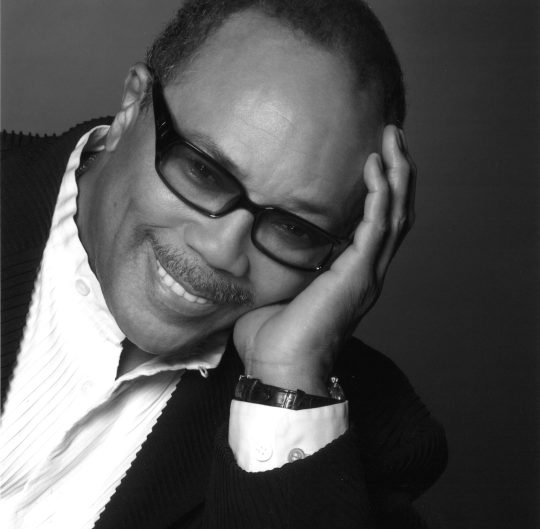
Quincy Jones
Musician, producer and arranger who had global hits with Michael Jackson, was the first black composer to find acceptance in Hollywood and won 28 Grammys
From the 1980s onwards, Quincy Jones, who has died aged 91, was best known for his production and arranging work with Michael Jackson, not least because his efforts on Jackson’s album Thriller helped make it one of the bestselling albums in pop history. But the superstar glare surrounding his work with Jackson tended to conceal the fact that there were many more layers to Jones’s abilities.
He worked with jazz stars such as Count Basie and Dizzy Gillespie, became a friend and collaborator of Frank Sinatra, and developed a flourishing career as a composer of soundtracks for film and TV. He enjoyed success under his own name in styles ranging from big-band jazz and swing to pop, soul and funk. He became an influential music business executive, a successful entrepreneur in film and TV production and launched the music magazine VIBE.
He was born in Chicago, the son of Quincy Jones Sr, a carpenter and semi-pro baseball player, and his wife, Sarah (nee Wells), a building manager. His parents divorced, Quincy Sr remarried, and the family moved to Bremerton, Washington, during the second world war, then to Seattle. Quincy Jr began playing the trumpet and singing in a gospel quartet at the age of 12, and when he met up with the teenaged Ray Charles, also based in the Seattle area, Charles encouraged him to take an interest in arranging. A course at the Berklee College of Music in Boston set Jones up for his first professional job, in 1951, with the bandleader Lionel Hampton.
His experiences on the road with the Hampton band were an eye-opener. “You couldn’t stay in white hotels, and to me, coming from Seattle, a lot of this stuff was like a slap in the face,” he said. “Back then, all the black bands had white bus drivers so they could eat, ’cos you couldn’t go into white restaurants. Even in Philadelphia, they had segregated hotels.” Jones left Hampton in 1953, having accompanied the band on a European tour and rubbed shoulders with a remarkable lineup of musicians including the trumpeters Clifford Brown and Art Farmer.
He set about making a living writing arrangements for jazz luminaries including Basie and Tommy Dorsey. Although Jones put in a stint as musical director for Gillespie’s ensemble in 1956, he was aware that the days of the big bands were numbered, and rock’n’roll was coming. “In a funny way, Lionel Hampton was one of the bands that was serious with a rock’n’roll sensibility, before we even knew what the word meant,” Jones said.
During 1957 and 1958, Jones based himself in France and Scandinavia. He continued to study composition – notably with Nadia Boulanger, mentor of Leonard Bernstein and Aaron Copland, among others – and took a job with Barclay Disques, the Paris-based subsidiary of Mercury Records. While in Europe he formed a star-studded big band of his own, and spent two years touring Europe and the US. He wrote material for Count Basie, and during the late 1950s and early 60s worked as an arranger and music director on recording sessions for vocalists including Billy Eckstine, Ella Fitzgerald, Dinah Washington and Sarah Vaughan.
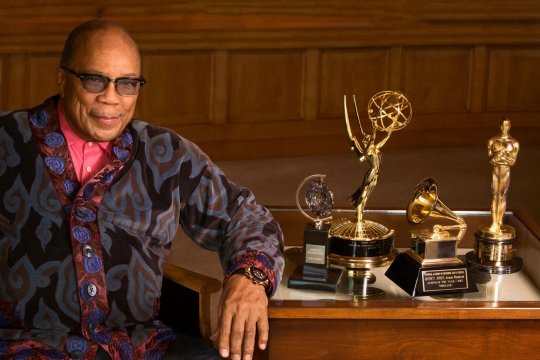
In 1964, Jones won his first Grammy award, for his arrangement of Basie’s song I Can’t Stop Loving You. He also produced four million-selling singles for Lesley Gore, including the US chart-topper and UK Top 10 hit It’s My Party (1963). His hectic career was matched by an equally eventful private life. In his memoir Q: The Autobiography of Quincy Jones (2001), he described how at one point he was dating five women at the same time.
His burgeoning profile was boosted by collaborations with Sinatra, Sammy Davis Jr and Andy Williams. Jones’s association with Sinatra produced the albums It Might As Well Be Swing (1964) and Sinatra at the Sands (1966), both featuring Basie’s band. Jones and Sinatra became close friends, Jones later writing that Sinatra was “hip, straight up and straight ahead, and above all, a monster musician”.
Jones’s track record gained him entry into the lucrative fields of film and television, and he became the first black composer to find acceptance within Hollywood. Throughout the late 60s and 70s he was commissioned to write scores for more than 30 movies and hundreds of TV shows. Among his better-known film projects are In Cold Blood (1967), In the Heat of the Night (1967), The Italian Job (1969) and The Getaway (1972). The theme from Ironside is his most instantly recognisable effort for the small screen, but his compositions for The Bill Cosby Show, Sanford and Son and his Emmy-winning work for the miniseries Roots proved enduringly popular.
As the 70s wore on, Jones displayed his instinct for moving with prevailing musical trends by immersing himself in funk and disco music. His album Body Heat, from 1974, featured the Brothers Johnson as the rhythm section, and Jones subsequently produced bestselling albums by the Brothers Johnson themselves.
Despite undergoing surgery to deal with twin brain aneurysms in 1974, Jones continued to work at a furious pace. He produced chart-busting albums for the disco queen Donna Summer and soul diva Aretha Franklin, and he found another musical soulmate in the guitarist George Benson. Their collaboration on Give Me the Night (1980) – the debut release on Jones’s Qwest label – was another career benchmark, the album reaching No 3 on the US album chart while the title track was a No 4 single.
Meanwhile Jones had hits under his own name. He had a US Top 30 success with Stuff Like That (1978), and in 1981 scored a Top 10 album with The Dude, which spun off the Top 30 hit Ai No Corrida (No 4 in the UK), and the Top 20 hits Just Once and One Hundred Ways, both featuring James Ingram. In 1998, the hit movie Austin Powers prompted a revival of Quincy’s 1962 hip-shaker, Soul Bossa Nova; it was also used as a theme for the 1998 football World Cup in France.
Jones first met Michael Jackson, then aged 12, at Davis Jr’s house, but it was not until Jones was working on the soundtrack for the film The Wiz (1978), starring Jackson and Diana Ross, that he was invited to produce a Jackson solo album. This was the 20m-selling Off the Wall (1979). Their collaboration continued with Thriller (1982) and Bad (1987), the trio selling 100m copies between them. In between, Jones was also the natural choice to produce the 1985 charity single, We Are the World, co-written by Jackson and Lionel Richie and performed by the all-star USA For Africa to benefit Ethiopian famine victims.
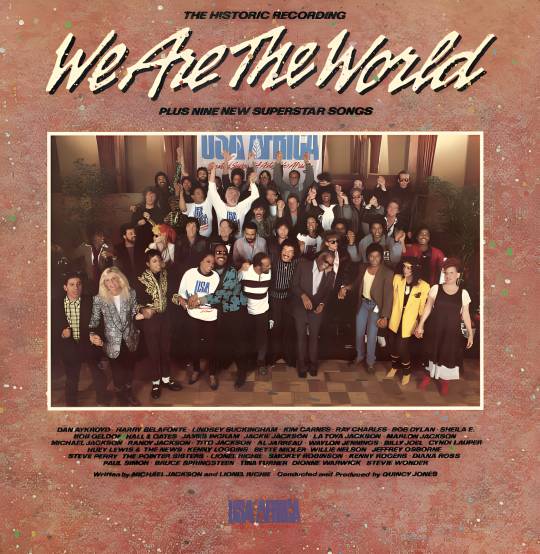
Jones was a pivotal figure in helping musicians take control of the business side of their work. Like most other musicians, he had grown accustomed in the early years of his career to having his royalties and copyrights appropriated by unscrupulous publishers or record labels. “If you write a song, the publishing is 50% of that,” Jones explained. “They would say: ‘I want 50% of your creation’, so that means you get 25%. That was normal.” He began to see the light when he took a job as A&R man at Mercury Records in New York in 1961. Within two years, he was made a vice-president, making him the first high-level black executive of a major record label. “I’d lost so much money when I had my band [the Jones Boys] in Europe that I had to go with a record company. That’s when I said: ‘I’d better pay attention to the other side, because it is a music business.’”
After moving from Mercury to A&M Records he launched Qwest, which became home to such varied artists as New Order, Milt Jackson, the Winans and Tevin Campbell. Qwest also did excellent business with the soundtracks to Malcolm X (1992) and the rap-generation movie Boyz N the Hood (1991).
Growing into the role of entertainment mogul, Jones co-produced Steven Spielberg’s film of The Color Purple in 1985 and produced its soundtrack. In 1990 he teamed up with Time Warner Inc to form Quincy Jones Entertainment; in 1991 he helped create the NBC television series The Fresh Prince of Bel Air, which launched Will Smith on the road to superstardom; and in 1993 he set up VIBE. He headed a consortium of businessmen that formed Qwest Broadcasting, which purchased TV stations in Atlanta and New Orleans.
Jones won an Emmy, 28 Grammys and three Special Grammy awards, including the Grammy Legend award in 1992, was given the Sammy Cahn lifetime achievement award from the Songwriters Hall of Fame in 1989, and was inducted into the Rock & Roll Hall of Fame in 2013. He was showered with honorary doctorates, Time magazine declared him one of the most influential jazz musicians of the 20th century, and in 1990 he was made a chevalier of the Légion d’honneur, promoted to commander in 2001.
He was celebrated in the film Listen Up: The Lives of Quincy Jones (1990) and the documentary Quincy (2018), directed by his daughter Rashida.
Three marriages ended in divorce. He is survived by a daughter, Jolie, from the first, to Jeri Caldwell; a daughter, Martina, and son, Quincy, from the second, to Ulla Andersson; two daughters, Rashida and Kikada, from the third, to Peggy Lipton; and by a daughter, Kenya, from a relationship with Nastassja Kinski, and a daughter, Rachel, with Carol Reynolds.
🔔 Quincy Delight Jones Jr, musician, producer, composer and arranger, born 14 March 1933; died 3 November 2024
Daily inspiration. Discover more photos at Just for Books…?
13 notes
·
View notes
Text
#new music

Unreleased recordings of Michael Jackson have been found in the USA

Tapes of unreleased Michael Jackson songs have been found in California.
These are the compositions he worked on shortly before the release of the album Dangerous, from about 1989 to 1991.

According to The Hollywood Reporter, it all started when former Highway Patrol officer Gregg Musgrove purchased an abandoned warehouse that once belonged to American producer and singer Brian Loren. He worked with Michael Jackson at one time. Gregg Musgrove, who at first did not suspect what a find awaited him in this building, discovered cassettes with fifteen recordings, twelve of which can be considered full-fledged songs. In addition, the tapes recorded conversations between Jackson and Lauren, which they conducted during their collaboration
"I'm listening to this and I get goosebumps because no one has ever heard it.", Musgrove admitted

In the recordings, for example, there is a song "Don't Believe It", whose fragments surfaced online. Presumably, it was supposed to be included in the Dangerous album. Journalists consider "Truth on Youth", recorded together with rapper LL Cool J., to be the most "exciting" track. She is a unique copy of the reading from Jackson's mouth.


Musgrove and his lawyer appealed to the Estate of Michael Jackson, which controls the singer's estate and his posthumous income. They conducted their own research, but in the end the company They refused to buy audio cassettes. Her representatives stressed that neither they nor anyone else who may purchase these recordings in the future own the copyrights to the recordings. In other words, these Jackson songs may remain unreleased. However, Musgrove plans to sell the tapes in the near future — he intends to appeal to four major auction houses.

#new music#music news#new#michael jackson#pop#soul#r&b#funk#rock#disco#post-disco#dance pop#new jack swing#music#my music#music love#musica#history music#rock music
7 notes
·
View notes
Text
I love the performance video with Jungkook and Usher. Seeing them dancing together brings a different energy into the collaboration. The chemistsry, mutual respect and enjoyment is there and very obvious to see. I love it.
JK's heart is shining, he's so happy. You can really see it in the end. That golden maknae, that 15 year old kid who gave up everything to take a chance on becoming an Idol, is experiencing his dream full-on.

Sharing space with a legend like Usher.
Having watched a few reaction videos (because I enjoy hearing the feedback), I have learned a few things about Usher. I honestly didn't know much about him as during the years he was really in the spotlight I was not listening to that genre of American music. I was focused more on world music, new age music, classical, and other genres. So I missed most of Usher, and in particular I missed his early days and connection with Michael Jackson.
I didn't know until today, that Usher brings a lot of Michael Jackson's dance style into his own.
The first SNTY video I loved, and could see some of the MJ influence in the choreo. In the performance video, it was made super obvious with JK's outfit in the first half.
So what I learned about the choreo with Usher is that some of it is choreo that Usher performed with Michael Jackson. That is super cool, in my book. That move near the end when Usher is dancing around JK is something that Usher did with Michael Jackson! People have called that out on YouTube and X. I just think it is so awesome to have a living legend, and a global Korean Super Star pay homage to Michael Jackson.
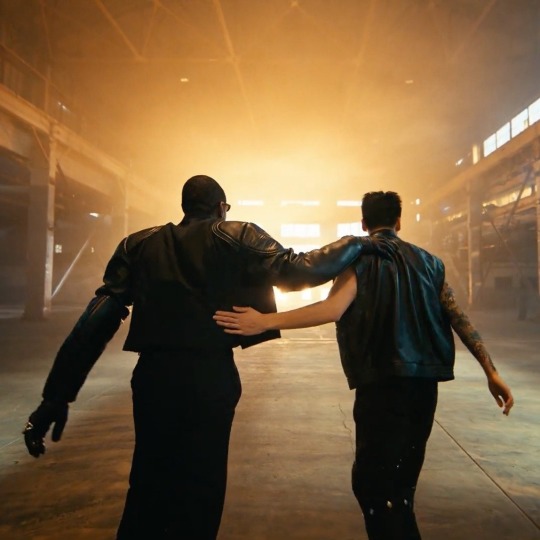
So, with this understanding of what Usher is bringing to this video comes even more respect for what he and Jungkook (and their teams) have created together. It is freaking amazing!
I am just so happy that Jungkookie was able to do this, before he enlisted. This is such a huge step for him, as a soloist.
It will be cool to see the trajectory of Jungkook's career, post-military. I can only imagine what is to come. 💜
50 notes
·
View notes
Text
Love Never Felt So Good
Baby, love never felt so good

You never imagined this day would come, yet here you are, fingers intertwined with Seungkwan’s under the soft golden light of the studio. It’s just the two of you, surrounded by an array of instruments and the lingering warmth of shared laughter. After two blissful years spent together, filled with sweet moments and late-night confessions, it’s finally time to let the world in on your secret. Your relationship, once a soft whisper shared only between the two of you, is about to blossom into something more vibrant and public.
As you both stand there, discussing the details of your collaboration video, a mix of excitement and nerves courses through you. This project is a playful declaration of your love, a lighthearted reminder to the world that love, much like music, should be celebrated. Today, you’ll be singing "Love Never Felt So Good," and there’s an undeniable magic in the air. Seungkwan nudges you gently with his shoulder, his radiant smile bright enough to chase away any doubts. “Let’s just have fun,” he says, his voice filled with warmth, and you nod, feeling your heart flutter at the sight of him.
The cameras start rolling, and the world fades away, leaving just the two of you in your own little bubble. The first notes of the song echo through the studio, and soon the rhythm wraps around you like a cozy blanket. Seungkwan’s voice blends with yours smooth, sweet, and harmoniously perfect. Every rise and fall in the melody feels amplified in the way your gazes lock, a silent acknowledgment of everything you’ve built together over the last couple of years.
As the chorus hits, you can’t help but move. You sway your hips, twirl around, and let laughter scatter through the air. Seungkwan matches your energy, his bright laughter blending seamlessly with the melody. You can’t control the wide grin that spreads across your face as he spins you, and in that very moment, all the nerves vanish. This is what it feels like to be truly alive, to share something so beautiful with the one you love.
Together, you both dance around, embodying the pure essence of joy. Your playful antics, goofy faces, and unfiltered affection for one another weave a story that transcends the screen. The way Seungkwan pretends to struggle with the high notes, dramatically covering his mouth in mock surprise, or the way you clutch your stomach laughing at his antics every second crafted in the essence of romance and camaraderie. You capture every little moment, your hearts leading the choreography. It’s a perfect portrait of young love, a celebration of both your relationships as singers and partners.
When the final notes drift into silence, there’s a gentle pause, time standing still in that studio. You look into Seungkwan’s eyes, and an unspoken understanding passes between you this isn’t just a collaboration. It’s an embodiment of your shared journey, an affirmation of love that has flourished in the quiet moments of tenderness and the boisterous bursts of laughter alike.
As you wrap the video, your hearts race with anticipation. The prospect of sharing this with your fans feels exhilarating, and as you lean in to plant a soft kiss on Seungkwan’s cheek, the warmth of the moment envelops you. He chuckles, his cheeks flushing a soft shade of pink, and you both know the world is about to witness something special.
Once you upload the video, the excitement spirals into an electric buzz. Notifications flood your phone, and soon, comments and likes begin to pour in. Your hearts swell with delight as the fans’ love and encouragement come rolling in. They adore the way you both fit together, your chemistry radiating through every frame; it’s as if the universe conspired to create this perfect moment just for you.
“Can’t believe they’re finally together!” one fan comments, while another follows up with a string of heart emojis and joyous exclamations. Their words bring a smile to your face, filling you with warmth. You read every comment as they burst with delight, sharing their love for the two of you. The world rejoices in your happiness, and in that fabric of support, the moment feels even more special.
As the sun sets, casting a warm glow through the windows of your studio, you sit beside Seungkwan, who’s scrolling through the latest updates. You rest your head on his shoulder, feeling a blend of contentment and gratitude wash over you. “We did it,” you whisper, almost in disbelief. He chuckles softly, wrapping his arms around you, drawing you closer. “And they love us,” he replies, eyes sparkling with joy.
In that serene moment, time feels infinite. You both share your dreams and aspirations, thoughts entangled with promises of the future. The uploading of this video marks not just a new chapter in your lives but an open door that ushers in infinite possibilities. The vulnerability of exposing your hearts to the world is exhilarating, but with Seungkwan by your side, you know you can face anything.
As you both drift into a comfortable silence, basking in the joy of the day’s adventure, there’s a beautiful sense of completion. You lean in, pressing a sweet kiss on his lips, a promise to cherish each other, to sing together through the ups and downs, and to dance like nobody’s watching. After all, love never felt so good.
#seventeen imagines#seventeen scenarios#svt fluff#svt x reader#seventeen#svt carat#svt#svt imagines#seventeen smut#svt smut#seungkwan svt#svt seungkwan#seungkwan smut#seungkwan scenarios#seungkwan seventeen#seventeen seungkwan#seungkwan#seventeen x you#seventeen x reader#seventeen series#seventeen angst#seventeen fanfic#seventeen fluff#Spotify
14 notes
·
View notes
Text
An example of how reinvent who you are: Bruno Mars from "Locked Out of Heaven" to "Leave the Door Open"
Welcome back ! so I talked about Sia last time and I think it's time for me to introduce you my favorite artist named Bruno Mars (I know I'm mainstream but let me convince you !) Peter Gene Hernandez was born in Honolulu, Hawaii grew up in a musical family, his nickname "Bruno" comes from the wrestler Bruno Sammartino (he apparently looked like him as a toddler) and "Mars" because it reflected his ambitions and was told by several women that "he was out of this world". He moved to L.A, was in a band named School Boys and struggled in having a place in music industry so he started writing because of getting frustrated. He was a track writer for popular songs including Right Round by Flo Rida and was the co-writer with K'naan to produce "Waving Flag" the Coca-Cola's theme song of the 2010's FiFA world cup ! He started to get credit by introducing himself as the 2010's hit song "Nothin' on You" with the rapper B.o.B and became a pop performer. Not to mention the fact that he collaborated with many artists such as Lil Wayne, Cardi B, Lady Gaga or producers such as Mark Ronson with "Uptown Funk"(who is the G.O.A.T. of the 2010's producers by the way, I'm really not lying ! If you don't know him he probably produced 80% of your 2010's playlist). He took inspiration from Michael Jackson, James Brown (of whom he did a tribute), Prince, Amy Winehouse, Stevie Wonder ... "It's not a secret. We wear the inspiration on our sleeves. What is the point if us, as musicians, can't learn from the guys that've come before us? What did they do?" In 2021, he teamed up with Anderson .Paak to create Silk Sonic: a R&B, Jazzy album with this iconic song "Leave the Door Open" which won the award of best record R&B song. In a nutshell, Bruno Mars did mainly pop music mixed up with different inspirations and artists and even produced an R&B album to prove his point as reinventing him as an artist. It's not like what you see in movies, where you walk into a record company and you're given all these great songs to sing. You have to write the song the world is going to want to hear and play it over and over again. I learned that the hard way here in L.A." Bruno Mars, After starting songwriting in L.A.
youtube
10 notes
·
View notes